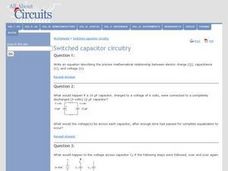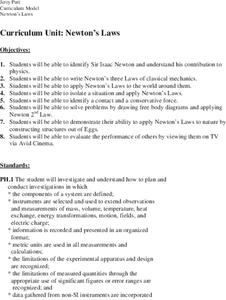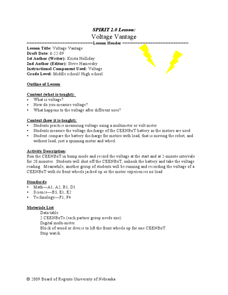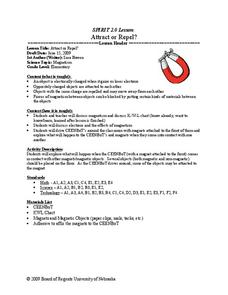Curated OER
Electrical Energy
Young scholars compare and contrast a cell and a battery. In this physical science lesson, students explain how they create energy. They conduct an experiment to apply what they have learned in this lesson.
K12 Reader
Waves and Currents
Waves, currents, crests, and troughs. Using information provided in an article about waves and currents, readers define terms used to describe how energy travels.
Curated OER
Build Your Own Submarine
Students construct their own submarine following a certain procedure. In this physics activity, students calculate the density of objects using a mathematical formula. They explain why some object floats in water while some do not.
Curated OER
How Lightening Works
Annotated diagrams explain the distribution of charged particles in clouds that can lead to lightening bolts. This is a super short slide show but it is useful for explaining the phenomenon and safety mechanisms.
Curated OER
How Do You Light Up Your World?
A tremendous presentation on the properties of light. Young scientists are treated to slides which share a lot of fascinating information about light. This impressive PowerPoint is filled with great photos, graphics, and discussion...
Curated OER
All About Circuits ~ Atomic Structure
In this interactive Internet assignment, physical science investigators answer 11 questions about the atom, the subatomic particles, and atomic structure. They can click on "Reveal Answer" to discover if they are correct. They also...
Carnegie Mellon University
Consumer Preferences in Lighting
What is a watt? This tongue-twisting, mind-bending question and others are answered through this lesson plan on the different lighting options available. With the support of a PowerPoint, teach your physical science class about units of...
Exploratorium
Diamagnetism
If you are attracted to activities dealing with diamagnetism, here is a rare find that you will appreciate. With a neodymium magnet and a few common materials, move a pair of juicy grapes without touching them. Though the fruit is...
Curated OER
Circuit Lab
Students explore the properties of electricity. This lab shows students the need for a circuit in order to have a flow of electricity. It demonstrates Ohm's law, which relates voltage, current, and resistance.
Curated OER
Call Me Bond, Hydrogen Bond
As amazing as James Bond is, the surface tension of water does not allow him to walk on it! In this series of little lab activities, physical scientists play with the properties of water due to the hydrogen bonds and resulting polarity....
Curated OER
Switched Capacitor Circuitry
In this electronics worksheet, students complete 15 short answers and problem solving questions related to capacitance circuits.
Curated OER
Newton's Laws
High schoolers examine and discuss Newton's Laws and discover his contribution to physics. In groups, they participate in an experiment in which they much apply the Laws to the world around them. They describe contact and conservative...
Curated OER
Construction of an Ammeter and a Voltmeter from a Galvanometer
Students explore series and parallel circuits. In this physics instructional activity, students construct a simple circuit and measure its maximum current. They construct their own voltmeter and ammeter that operates at a specified range.
University of Colorado
The Jovian Basketball Hoop
Can you listen to Jupiter on a simple radio? Turns out the answer is yes! The resource instructs scholars to build a simple radio to pick up the radio waves created when the charged particles from the sun hit Jupiter's magnetic...
University of Colorado
The Jovian Basketball Hoop
A radio receives radio signals, converts them to an electrical signal, then converts this signal to a sound signal, and amplifies the sound so people can hear it. Class members use this information to create a short-wave radio antenna...
Curated OER
Solar Kit Lesson #6: Solar-Powered Battery Charger
In a previous lesson, learners build an ammeter. That ammeter, or a pre-made one, is required in order to carry out this lesson. The objective is for lab groups to design a way to connect solar cells that can recharge a battery. Basic...
Curated OER
Technology (Post Lab): Utility Companies
Students study physics. In this utility company research instructional activity, students discover how their local utility company charges for electricity. They listen to a presentation and then conduct internet research to find more...
Curated OER
Voltage Vantage
Students measure the voltage discharge of robots as the motors are used. In this physics lesson plan, students explain how to use a multimeter to measure voltage. They graph the voltage change over time and present their findings in...
Curated OER
A Simple Motor
Instructions for building a simple electromagnetic motor are provided for the teacher. Aside from some sketchy background information and a list of content standards to be met, that is about all you will find in this resource. The motor...
Curated OER
Unknown Element Project
Learners work with a partner to determine the identity of an unknown element based on given descriptions. Groups use classroom textbooks, encyclopedias, and science internet sites to identify their unknown element then write a report as...
Curated OER
Newton's Laws
Students identify Sir Isaac Newton and his contribution to physics. They write Newton's three Laws of classical mechanics. and apply Newton's Laws to the world around them. They isolate a situation and apply Newton's Laws.
Curated OER
Invisible Investigations
Students simulate how charged particles move in a particle detector. In this physics lesson, students observe how iron filings behave when magnetic marbles are passed underneath them. They record and draw their observations.
Curated OER
Attract or Repel?
Students explain why some objects attract and some do not. For this physics lesson, students investigate the magnetic properties of objects using CEENBoT. They give some important applications of magnets.
Curated OER
Making a Battery
Fifth graders make a battery. In this physical science lesson, 5th graders word in pairs make the battery. Students follow 4 steps to create the battery.

























